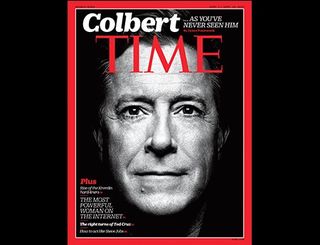Colbert Grabs Cover of Time Magazine

Stephen Colbert, who takes over as host of CBS’ Late Show next month, is on the cover of the newest issue of Time magazine.
In the black and white photo, Colbert looks very different than the character he played on Comedy Central.
Here are some highlights from the magazine’s interview with the comic.
On talking with David Letterman before he went off the air, Colbert tells Time: “We had a very lovely evening. We had a couple bottles of water, and he answered questions. It was two guys with similar jobs talking shop. And at the end of the night, he showed me how to run the freight elevator, which is how you get down to the theater.… After that, I went across the street, got myself a cup of coffee and looked at the theater from the outside for about an hour, and I realized that nothing we do right now really matters. I mean, we’ll do our best to have a good design and a good logo and a good marquee and hire all the right people and have the right sound and the right guests. But it doesn’t really matter until you go and do it. Everything is theory. As Yogi Berra beautifully said, ‘In theory, there’s no difference between theory and practice. In practice, there is.’”
On how he’s planning to introduce his audience to the real Stephen Colbert: "We’ve got a series of field pieces, packages that are ways for me to try to figure out who that is, as if I don’t know who I am. The unexamined life can be extremely enjoyable, and who knows if I do know who I am. We’re going to see whether I do. I’ll have my own suppositions as to what these answers might be from people and see if their memory of me is the same or whether the police investigator we hired to investigate me to finds out. We’re doing a series called 'Who Am Me?'"
On the desk on his new set: "The desk is not a limitation. The desk can be Snoopy's doghouse."
On being “American neutral”: “I am a white, male, straight, Christian—Catholic, so, you know, Microsoft Christian—American who enjoys McDonald’s and Coca-Cola. For a lot of American history, I am American neutral. It makes me wonder why that is or whether that’s a good thing, but it’s also a great place to do comedy from because it oddly separates me from what I imagine a comedian is supposed to be. I am comfortably integrated into American society, and yet I am in a business that’s full of outsiders.”
Broadcasting & Cable Newsletter
The smarter way to stay on top of broadcasting and cable industry. Sign up below
On why he’s grateful that he was settled in life before getting this job: "I feel very lucky that I got this kind of gig as old as I was. I was 41 before anybody stopped me on the street, so I hope I had a sense of who I was."
On the skepticism before The Colbert Report aired: “They said, ‘You can’t do a nightly show in character—it won’t last until Christmas. And now there’s a lot of ‘You can’t do the show not in character.’ Evidently nobody has any belief that I can do anything.”
On the rise of the nerd: “‘Nerd’ now is like someone discovering your favorite band. I was a nerd when nerd was nerd. OK? Alright? There was no reward. No one catered to us. We weren’t a demographic. We were a punching bag and a punch line. There was a movie called Revenge of the Nerds because the nerds needed revenge because of all of the things that were happening to them. That’s a cultural artifact that people need to understand. Revenge of the Nerds is proof that nerding has changed.”
On what he wanted to be when he grew up: “When I was a kid I wanted to be an astronaut. Then I wanted to be Jacques Cousteau, I wanted to be a marine biologist. But I’m deaf in one ear, this one, the freakish one right here. And I don’t have an eardrum in here. So I couldn’t do that. So then now what am I going to do. So then I was a teenager for a while, and that’s a career. And I decided oh, I’ll be an actor. I really thought I’d be an actor. And like actor actor, like beard, wear a lot of black actor. And then I met people in improvisation and I started to improvise with them and I went oh, this is – A) you don’t have to memorize any lines, I’m all for that. And I just loved the spirit of improvisation, sort of us creating something collectively, and nobody being able to invent it but it’s all discovery.”
Jon has been business editor of Broadcasting+Cable since 2010. He focuses on revenue-generating activities, including advertising and distribution, as well as executive intrigue and merger and acquisition activity. Just about any story is fair game, if a dollar sign can make its way into the article. Before B+C, Jon covered the industry for TVWeek, Cable World, Electronic Media, Advertising Age and The New York Post. A native New Yorker, Jon is hiding in plain sight in the suburbs of Chicago.

